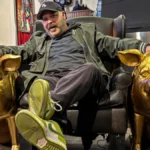Mario Vargas Llosa, the towering figure of Peruvian novels, political thought, and Nobel laureate, died on April 13, 2025, in Lima, Peru, at 89. According to family members, he passed peacefully, in their midst. The family has not shared the full medical details, but reports confirm that he died due to pneumonia.
A Literary Titan of the Latin American Boom
Vargas Llosa was born in Arequipa, Peru, in 1936 and emerged as one of the prominent voices of the Latin American Boom alongside Gabriel Garcia Marquez, Julio Cortázar, and Carlos Fuentes. His novels, sometimes employing even experimental forms of narrative, dissected themes of authoritarianism, the military, moral decay, and psychological tensions within postcolonial neverlands.His first great work, The Time of the Hero (1963), drew the ire of the authorities since it was a blistering expose of life in a military academy. Indeed, army officials were so enraged that they organized public burnings of all copies of the book. He went on to write The Green House (1966), an intricate work about sexuality and corruption, and Conversation in the Cathedral (1969), a powerful indictment of Peru’s dictatorship.

The Nobel and Global Recognition
Vargas Llosa received the Nobel Prize in Literature in 2010, with the Swedish Academy recognizing his “cartography of power structures” and the sophisticated investigations into individual resistance. He has lectured at Harvard, Princeton, and Oxford, and published columns in international media, including El País and The New York Times.
In 1990, he ran for the presidency of Peru, coming second in an election that consolidated Vargas Llosa’s prominence not only as a novelist but also as an A public intellectual and defender of liberal democracy.
Literary Legacy and Cinematic Adaptations
Vargas Llosa wrote over thirty books, novels, essays, memoirs, and plays—many of which made their way to the silver screen. Film adaptations abound; in some cases, Vargas Llosa co-wrote the screenplays himself:
Films Written or Adapted by Mario Vargas Llosa
Pantaleón y las Visitadoras (1976)
The co-writer was Vargas Llosa
It is based on the novel Captain Pantoja and the Special Service
A dark satire on a military-run prostitution ring in the Amazon.
La ciudad y los perros / The City and the Dogs (1985)
Screenplay by Vargas Llosa and José Watanabe
Adapted from The Time of the Hero
A brazen critique of toxic masculinity and systemic abuse in a military school.
Tune in Tomorrow (1990)
Taken from Aunt Julia and the Scriptwriter
Keanu Reeves and Peter Falk star
Although the screenplay was not written by Vargas Llosa, the film presents a new interpretation of his autobiographical novel set in 1950s New Orleans.
La fiesta del chivo / The Feast of the Goat (2005)
Co-written by Vargas Llosa
Based on his own novel about Dominican dictator Rafael Trujillo
A chilling political drama with Isabella Rossellini, directed by his cousin Luis Llosa.
His stories, with their deep political resonance and human drama, continue to be studied in universities and adapted for screen and stage all over the world.
His stories, which have strong political resonance and human drama, continue to be discussed in universities and adapted for screens and theaters around the globe.
Ideological Evolution and Controversy
His changing view on ideological matters was fraught with much controversy. Once an admirer of the Cuban Revolution, Vargas Llosa later became one of its fiercest critics. He became an outspoken advocate for classical liberalism and democracy, often arguing against a leftist establishment. His political essays and disputes were just as much a source of influence—and at times, division—as his fiction.
A Nation and a World in Mourning
With the announcement of his death, Peruvian President Dina Boluarte ordered a national mourning. An outpouring of tributes came from across the world, with Salman Rushdie, Isabel Allende, and J.M. Coetzee honoring a man they called “an ethical voice of Latin America.”
A private funeral service will take place, which honors his wish for discretion in this last farewell.
Mario Vargas Llosa is not merely a man of letters but a whole chapter in the story of Latin America. With him dies an era; however, his words, principles, and characters will walk down the library, classroom, and film reel for generations.



Normally I don’t read post on blogs, but I wish to say that this write-up very compelled me to take a look at and do it! Your writing taste has been surprised me. Thanks, quite nice article.
I’ll immediately grab your rss feed as I can’t find your e-mail subscription link or e-newsletter service. Do you have any? Please let me know in order that I could subscribe. Thanks.
I genuinely enjoy reading through on this internet site, it has got great articles. “Words are, of course, the most powerful drug used by mankind.” by Rudyard Kipling.
You actually make it seem so easy along with your presentation however I to find this matter to be actually something which I feel I might never understand. It sort of feels too complex and extremely extensive for me. I am looking forward to your next submit, I¦ll attempt to get the hold of it!
It is in point of fact a nice and useful piece of info. I’m satisfied that you shared this helpful info with us. Please stay us informed like this. Thank you for sharing.
Hi there, I discovered your web site by means of Google while looking for a similar matter, your website came up, it seems to be good. I have bookmarked it in my google bookmarks.